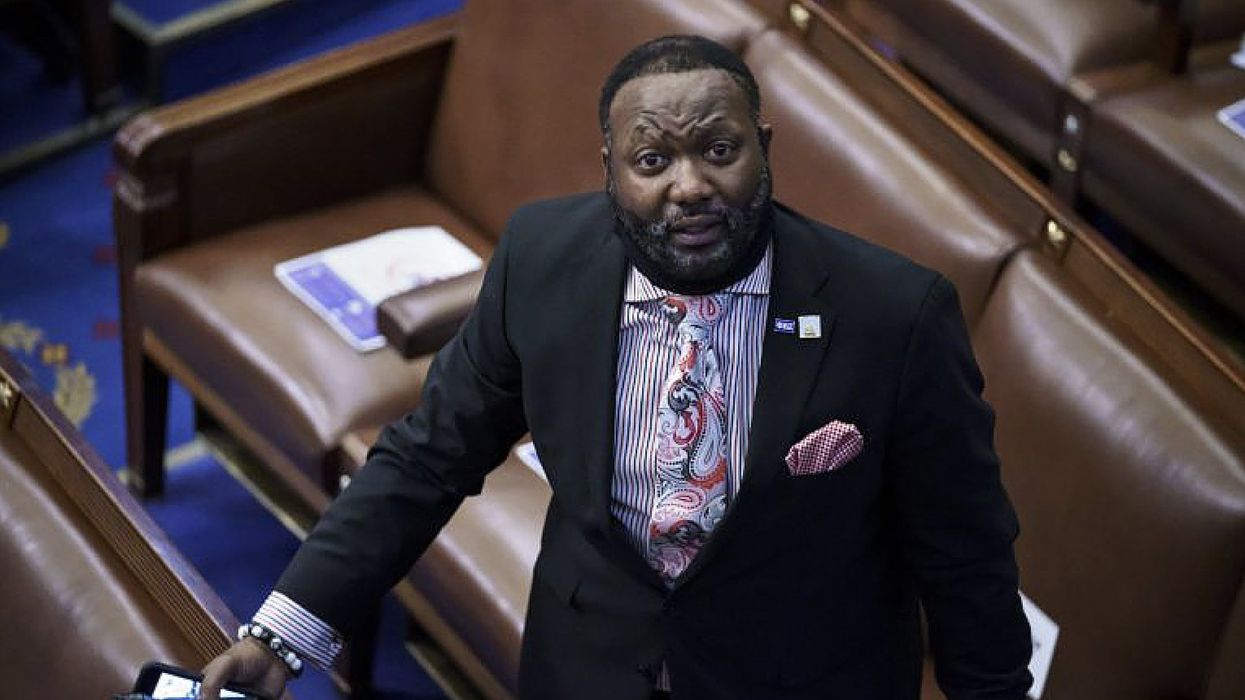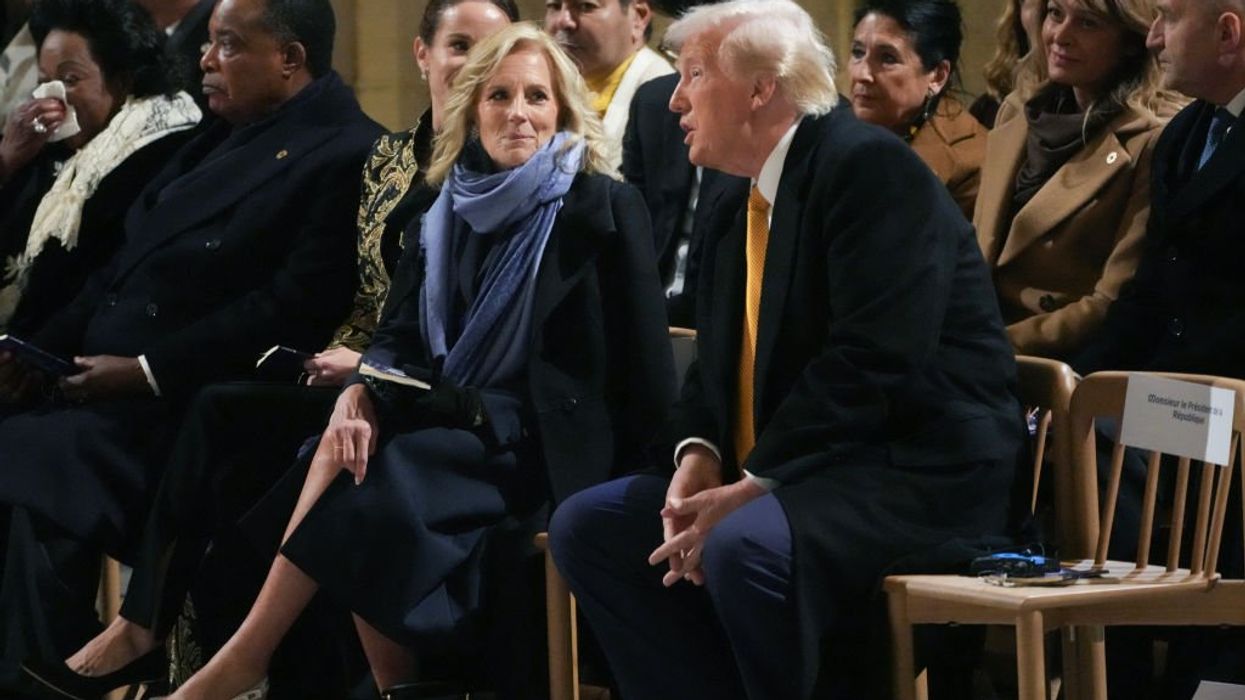WASHINGTON (TheBlaze/AP) -- The British newspaper The Guardian on Friday reported that President Barack Obama has ordered national security and intelligence officials to draw up a list of potential cyber targets overseas. The report was based on a leaked document that lays out the secret directive.
The directive also "contemplates the possible use of cyber actions inside the US, though it specifies that no such domestic operations can be conducted without the prior order of the president, except in cases of emergency," according to the report.
Not soon after the leaked document surfaced, the Obama administration said that it is refining its use of offensive cyber operations to counter evolving threats of electronic assaults against the United States.
Caitlin Hayden, spokeswoman for the National Security Council, said Friday a directive signed by President Barack Obama last year calls for government cyber tools to be "integrated with the full array of national security tools we have at our disposal."
The Guardian report comes as Obama was about to meet with Chinese President Xi Jinping, with alleged Chinese hacking against the U.S. to be one of the main topics of discussion.
While the newspaper report offers details about Obama's directive that had not been made public before, the White House released a declassified summary of the directive in January.
(Read the full leaked document here)
Moreover, the Pentagon acknowledged in March that it was setting up a series of cyber teams charged with carrying out offensive operations to combat the threat of an electronic assault on the United States.
 US President Barack Obama gestures towards California Governor Jerry Brown as he disembarks from Air Force One at Palm Springs International Airport in Palm Springs, California, on June 7, 2013. Obama arrived in Palm Springs to meet with Chinese President Xi Jinping. Credit: AFP/Getty Images
US President Barack Obama gestures towards California Governor Jerry Brown as he disembarks from Air Force One at Palm Springs International Airport in Palm Springs, California, on June 7, 2013. Obama arrived in Palm Springs to meet with Chinese President Xi Jinping. Credit: AFP/Getty Images
Gen. Keith Alexander, the top officer at U.S. Cyber Command and the National Security Agency, testified March 12 before the Senate Armed Services Committee that the potential for an attack against the nation's electric grid and other essential systems is real and that the federal government needed to take more aggressive steps.
At the time, Alexander said 13 cyber teams were being formed to guard the nation against destructive attacks in cyberspace, stressing that their role would be offensive. He also said the teams would work outside the United States, but he did not say where.
 WASHINGTON, DC - JULY 09: National Security Agency Director Gen. Keith Alexander speaks about cybersecurity and the new threats posed to the U.S. economy and military at the American Enterprise Institute July 9, 2012 in Washington, DC. Alexander is also the commander of the U.S. Cyber Command and chief at the Central Security Service, with responsibility for national foreign intelligence, combat support and U.S. national security information system protection. Alexander said that in cyberspace 'the probability for crisis is mounting,' and that now is the time for putting into place strong policies and rules for operations and defense. Credit: Getty Images
WASHINGTON, DC - JULY 09: National Security Agency Director Gen. Keith Alexander speaks about cybersecurity and the new threats posed to the U.S. economy and military at the American Enterprise Institute July 9, 2012 in Washington, DC. Alexander is also the commander of the U.S. Cyber Command and chief at the Central Security Service, with responsibility for national foreign intelligence, combat support and U.S. national security information system protection. Alexander said that in cyberspace 'the probability for crisis is mounting,' and that now is the time for putting into place strong policies and rules for operations and defense. Credit: Getty Images
"This directive will establish principles and processes that can enable more effective planning, development and use of our capabilities," Hayden said in a statement Friday. "It enables us to be flexible, while also exercising restraint in dealing with the threats we face. It continues to be our policy that we shall undertake the least action necessary to mitigate threats and that we will prioritize network defense and law enforcement as the preferred courses of action."
The timing of Friday's report coincides with Obama's two days of meetings with Xi at a California retreat. Top issues are cybersecurity and North Korea's nuclear threats.
The Guardian's report is the third significant leak of classified information this week. Following other revelations, the Obama administration has conceded that it has been secretly seizing phone records from millions of Americans and scouring U.S. Internet data for evidence of potential terrorist plotting.
Obama himself weighed in Friday, defending the counterterrorism measures and noting that they are authorized and reviewed by Congress. He also said the Internet surveillance program does not apply to U.S. citizens or to people living in the United States.
"I don't welcome leaks, because there's a reason why these programs are classified," Obama said, before the latest Guardian report. "In our modern history, there are a whole range of programs that have been classified because, when it comes to, for example, fighting terror, our goal is to stop folks from doing us harm, and if every step that we're taking to try to prevent a terrorist act is on the front page of the newspapers or on television, then presumably the people who are trying to do us harm are going to be able to get around our preventive measures."
----
Associated Press writer Richard Lardner contributed to this report.

 US President Barack Obama gestures towards California Governor Jerry Brown as he disembarks from Air Force One at Palm Springs International Airport in Palm Springs, California, on June 7, 2013. Obama arrived in Palm Springs to meet with Chinese President Xi Jinping. Credit: AFP/Getty Images
US President Barack Obama gestures towards California Governor Jerry Brown as he disembarks from Air Force One at Palm Springs International Airport in Palm Springs, California, on June 7, 2013. Obama arrived in Palm Springs to meet with Chinese President Xi Jinping. Credit: AFP/Getty Images
 WASHINGTON, DC - JULY 09: National Security Agency Director Gen. Keith Alexander speaks about cybersecurity and the new threats posed to the U.S. economy and military at the American Enterprise Institute July 9, 2012 in Washington, DC. Alexander is also the commander of the U.S. Cyber Command and chief at the Central Security Service, with responsibility for national foreign intelligence, combat support and U.S. national security information system protection. Alexander said that in cyberspace 'the probability for crisis is mounting,' and that now is the time for putting into place strong policies and rules for operations and defense. Credit: Getty Images
WASHINGTON, DC - JULY 09: National Security Agency Director Gen. Keith Alexander speaks about cybersecurity and the new threats posed to the U.S. economy and military at the American Enterprise Institute July 9, 2012 in Washington, DC. Alexander is also the commander of the U.S. Cyber Command and chief at the Central Security Service, with responsibility for national foreign intelligence, combat support and U.S. national security information system protection. Alexander said that in cyberspace 'the probability for crisis is mounting,' and that now is the time for putting into place strong policies and rules for operations and defense. Credit: Getty Images


